Category:
Tuesday 22 April 2014
Wednesday 2 April 2014
Bombs at Egypt university hit riot police, 1 dead
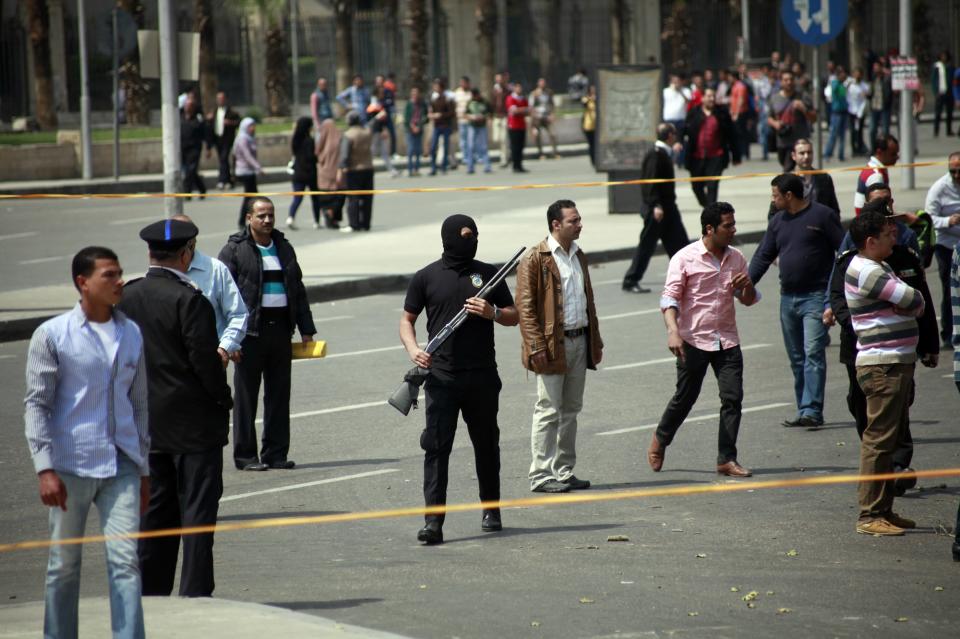
CAIRO — Three bombs exploded Wednesday outside Cairo University's main campus, hitting riot police deployed against near daily protests by Islamist students, killing a police general and wounding seven others, including several top police officers.
The staggered nature of the blasts in a relatively close area introduced a new tactic. The first two bombs, which security officials said were hidden at the foot of a tree, went off less than a minute apart. The third, concealed up another tree nearby, exploded nearly two hours later.The bombings were the latest in a campaign of attacks targeting Egypt's police and military that began with the ouster last summer of Islamist President Mohammed Morsi. The attacks are taking place amid a fierce crackdown by security forces against pro-Morsi protesters and members of Morsi's Muslim Brotherhood.
The first two blasts killed the police general and wounded seven, the officials said. They had earlier reported that a civilian was also killed, but later explained that the general's civilian clothes had led to confusion and that he was the lone fatality in the bombings. They identified him as Brig. Gen. Tareq al-Margawy.
No one was harmed by the last explosion. Egyptian state TV described the bombs as crude and homemade.
The officials spoke on condition of anonymity because they were not authorized to talk to the press.
View gallery

An Egyptian woman, center, is escorted out of the site of multiple bombings outside the main campus …
An television cameraman at the scene said the three blasts took place near a makeshift police post, where officers usually stay near truckloads of riot police.
The cameraman was barely 20 meters (yards) away when the third bomb went off. He and other journalists were then chased away by police from the area.
Cairo University, along with other university campuses, has been a major center for the near daily protests by pro-Morsi students against the military-backed interim government — since the monthslong crackdown has largely crushed protests elsewhere. The university protests often turn into clashes with security forces.
Wednesday's bombs appeared to target riot police deployed outside Cairo University to confront any protests, though none were going on at the time of the blasts.
The wounded included four civilians and three senior police officers, including Maj. Gen. Abdel-Raouf El-Sirafy, who is the deputy chief of police in the Giza province, parts of which are located in the Greater Cairo area. Cairo University's main campus is in Giza.
View gallery
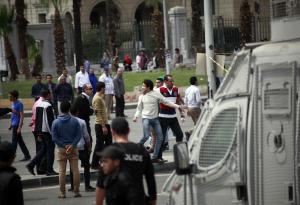
Egyptian security forces detain people after multiple explosions hit the area outside the main campu …
Egypt has seen a series of suicide bombings, car bombings and assassination targeting security forces, and an al-Qaida-inspired militant group based in the Sinai Peninsula called Ansar Beit al-Maqdis, has taken responsibility for most of them. Cruder bombings have also targeted police patrols and positions in the street, often claimed by lesser known militant groups.
The military-backed interim government has branded Morsi's Muslim Brotherhood a terrorist organization, accusing it of organizing the campaign of violence while it pushes ahead with protests against Morsi's removal by the military. Hundreds of Islamists have been killed and more than 16,000 arrested in authorities' bid to crush the Brotherhood.
The group denies any link to terror organizations and insists its protests are peaceful. It says the prosecution of its members is intended to give a legal veneer to what it sees as the illegal removal of an elected president.
Pokok Baobab
Pernah anda melihat pokok yang hanya berdaun pada bahagian atas? Walaupun rupanya agak pelik, tetapi tumbuhan ini yang dikenali sebagai Baobab mempunyai pelbagai fungsi kepada hidupan lain.
Mendapat gelaran sebagai pokok kehidupan kerana ia mampu memberikan makanan, minuman dan tempat berteduh kepada manusia dan haiwan. Buah daripada pokok ini diberi nama `monkey bread' atau roti monyet dan mempunyai kandungan vitamin C yang sangat tinggi.
Pokok ini juga adalah pokok kebangsaan bagi Madagascar. Sejak tumbuh pokok ini tidak pernah mengeluarkan daun. Hal ini menyebabkan dahan dan ranting kelihatan seperti akar pokok.
Mendapat gelaran sebagai pokok kehidupan kerana ia mampu memberikan makanan, minuman dan tempat berteduh kepada manusia dan haiwan. Buah daripada pokok ini diberi nama `monkey bread' atau roti monyet dan mempunyai kandungan vitamin C yang sangat tinggi.
Pokok ini juga adalah pokok kebangsaan bagi Madagascar. Sejak tumbuh pokok ini tidak pernah mengeluarkan daun. Hal ini menyebabkan dahan dan ranting kelihatan seperti akar pokok.
Tuesday 4 February 2014
District of Columbia city council to vote on decriminalizing pot

WASHINGTON - The District of Columbia's city council will vote on Tuesday on whether to decriminalize marijuana in a move that could make smoking a joint a violation comparable to a parking ticket.
The bill is expected to pass the first of two votes required for legislation in the district, since eight of the council's 13 members have sponsored the measure, and Democratic Mayor Vincent Gray has said he favors it.
The decriminalization law could face scrutiny from Congress, which has constitutional oversight over the capital.
Morgan Fox, a spokesman for the Marijuana Policy Project, a U.S. advocacy group, however, said there has been no sign the House of Representatives' Oversight Committee would oppose the measure. A committee spokesman did not respond to a request for comment.
Marijuana is illegal under federal law, but 20 U.S. states and the District of Columbia allow medical marijuana use. Colorado and Washington state have legalized recreational use.
If the measure is approved, the U.S. capital would join 15 states and a handful of cities that have removed the threat of arrest for possession of small amounts of marijuana.
Supporters have portrayed decriminalization in Washington as a way to cut law enforcement costs and increase fairness. A study by the American Civil Liberties Union has shown that eight times more black people are arrested for pot possession in the nation's capital than people of other races.
The proposal would eliminate criminal penalties for marijuana possession. The proposed $25 fine for having less than an ounce of pot is smaller than most city parking tickets. People smoking in public would be fined $100, and minors would have a letter sent to their parents.
Possession of marijuana in Washington is now a misdemeanor carrying up to six months in jail and a $1,000 fine, except for the handful of patients who use medical marijuana. The starting price for medical marijuana in the District is about $300 an ounce.
A Washington Post poll last month showed that 63 percent of city residents favored legalizing marijuana, up from almost half in 2010. Activists in the heavily Democratic city are seeking to put an initiative on the November ballot that would legalize possession of up to two ounces (56 grams) of marijuana and three mature pot plants for personal use.
President Barack Obama said in a New Yorker magazine interview last month that smoking marijuana was a "bad habit," but thought penalties fell disproportionately on minorities. States legalizing pot should go ahead with their plans, he said.
Marion Caunter Nafi Sering Guna Jet Peribadi
Sebut saja nama Marion Caunter, pasti ramai wanita di luar sana yang cemburu dengan wanita kelahiran Pulau Pinang ini. Mana tidaknya, personaliti ini bukan sahaja memiliki wajah jelita serta bentuk badan menawan, malah ibu kepada dua puteri comel, Leia Rose, 2, dan Lana Rose, 3 bulan ini turut bertuah apabila bertemu jodoh dengan Pengarah Urusan Kumpulan Syarikat Naza, SM Nasarudin SM Nasimuddin.
Namun, sudah menjadi resam dunia, ada juga segelintir manusia yang dengki dengan kehidupan pengacara E! News Asia ini. Bukan setakat dilimpahi kemewahan dengan berpakaian serta menggunakan barangan berjenama, namun pemilik nama Marion Rose Caunter Abdullah ini juga dikatakan mengembara menggunakan jet peribadi sekaligus membuatkan segelintir pihak panas punggung dengan kehidupan mewah yang diraihnya.
“Mana ada saya selalu naik jet peribadi. Saya hanya naik sekali-sekala sahaja. Secara jujur, saya tidak pernah memikirkan soal kemewahan atau kekayaan. Bagi saya, segala kemewahan yang saya kecapi ini adalah satu bonus. Secara peribadi, saya hanya mahukan anak-anak, suami serta keluarga kami sihat dan bahagia.
Namun, sudah menjadi resam dunia, ada juga segelintir manusia yang dengki dengan kehidupan pengacara E! News Asia ini. Bukan setakat dilimpahi kemewahan dengan berpakaian serta menggunakan barangan berjenama, namun pemilik nama Marion Rose Caunter Abdullah ini juga dikatakan mengembara menggunakan jet peribadi sekaligus membuatkan segelintir pihak panas punggung dengan kehidupan mewah yang diraihnya.
“Mana ada saya selalu naik jet peribadi. Saya hanya naik sekali-sekala sahaja. Secara jujur, saya tidak pernah memikirkan soal kemewahan atau kekayaan. Bagi saya, segala kemewahan yang saya kecapi ini adalah satu bonus. Secara peribadi, saya hanya mahukan anak-anak, suami serta keluarga kami sihat dan bahagia.
Alhamdulillah saya bersyukur dengan segala yang saya perolehi. Saya akui hidup saya bertuah tapi saya juga lalui kesedihan dalam hidup saya. Saya kehilangan orang yang istimewa dalam hidup saya sejak kecil dan saya membesar tanpa seorang ayah. Bagi saya semua orang ada kehidupan masing-masing dan apa yang penting, kita terima saja apa yang kita peroleh dengan kesyukuran,” tutur Marion lantas berkongsi tentang perkembangan kariernya ketika ini.
“Sejak mendirikan rumahtangga, saya sudah mula memperlahankan kerjaya seni saya kerana fokus saya kini lebih kepada suami dan anak-anak. Namun, jika diberi pilihan antara menjadi ibu atau wanita bekerjaya, saya memilih kedua-duanya di mana saya ingin menjadi seorang ibu yang mencintai kerjayanya.
Walau bagaimanapun, sudah pasti keutamaan saya adalah keluarga. Tidak dinafikan sebelum ini pernah juga terlintas untuk berhenti, namun minat saya dalam bidang ini masih kuat. Mungkin jika saya sudah mula rasa tidak seronok atau merungut dengan apa yang saya lakukan sekarang, mana tahu mungkin saya akan bersara,” ujarnya mengakhiri perbualan.
“Sejak mendirikan rumahtangga, saya sudah mula memperlahankan kerjaya seni saya kerana fokus saya kini lebih kepada suami dan anak-anak. Namun, jika diberi pilihan antara menjadi ibu atau wanita bekerjaya, saya memilih kedua-duanya di mana saya ingin menjadi seorang ibu yang mencintai kerjayanya.
Walau bagaimanapun, sudah pasti keutamaan saya adalah keluarga. Tidak dinafikan sebelum ini pernah juga terlintas untuk berhenti, namun minat saya dalam bidang ini masih kuat. Mungkin jika saya sudah mula rasa tidak seronok atau merungut dengan apa yang saya lakukan sekarang, mana tahu mungkin saya akan bersara,” ujarnya mengakhiri perbualan.
Monday 3 February 2014
26 killed in Syria regime barrel bomb raids on Aleppo
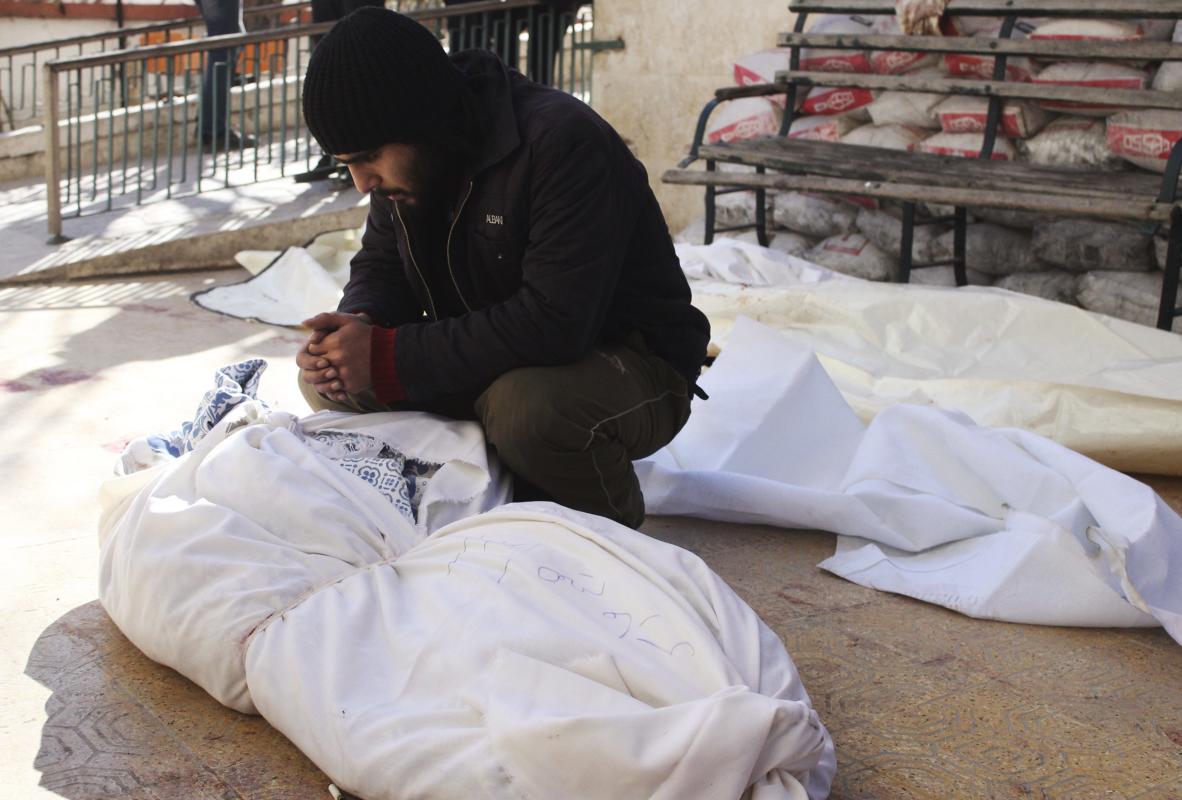
Beirut - At least 26 people were killed in aerial attacks with explosive-packed barrel bombs in the northern Syrian city of Aleppo on Monday, the Syrian Observatory for Human Rights said.
Rebel-held areas have been subjected to a punishing string of aerial raids by Syria's army in the past three days, with at least 36 people killed on Sunday and 85 killed on Saturday, according to the NGO.The group said 12 men, 11 children and three women were killed when Syrian army helicopters dropped the controversial weapons on neighbourhoods in the east of the city, once Syria's economic hub.
The Observatory said Monday that January 2014 was the bloodiest month in the conflict so far, with 5,794 deaths recorded.
The air raids, which come as government troops press an advance into the eastern and northern parts of the city, have prompted a mass exodus of civilians, Observatory director Rami Abdel Rahman said.
"Residents of the eastern neighbourhoods began fleeing about three days ago as the pace of the barrel bomb attacks increased," he told
"Some of them have gone to Turkey, but many of them have nowhere to go but regime-controlled areas in the west of the city because of the fighting between rebel forces and the (jihadist) Islamic State of Iraq and the Levant in other parts of Aleppo."
A security source in Damascus confirmed that civilians were fleeing to government-held parts of the city, and AFP photographers saw long lines of people at checkpoints separating rebel and government-controlled areas.
Fighting began in Aleppo in mid-2012, with the city quickly being divided between government control in the west and rebel control in the east.
The situation has remained a stalemate for months, but the army has made several advances in surrounding Aleppo province, including capturing an area around Aleppo international airport.
The advances there allowed the government to reopen the airport, which had been closed for nearly a year because of fighting nearby.
Over the weekend, regime forces seized most of the eastern district of Karam al-Turab, state media and the Observatory said, and the army is pushing to take additional eastern and northern areas.
In Hama province of central Syria, meanwhile, the Observatory said at least five students were killed in rebel rocket fire on a majority Alawite town.
President Bashar al-Assad is from the Alawite community, while the uprising against him is dominated by Sunnis.
More than 136,000 people have died since the conflict in Syria began with peaceful anti-government protests in March 2011.
The spike in deaths came despite 10 days of talks between the government and regime in Geneva that ended last Saturday without tangible results.
Convicted murderer escapes from Michigan prison
IONIA, Mich. — An intense manhunt was underway Monday for a convicted killer who peeled a hole in two fences with his hands to escape from a Michigan prison before abducting a woman and fleeing to Indiana where the victim and her vehicle were safely recovered, authorities said.
Officials were stunned by the brazen escape Sunday night of Michael David Elliot, who had a record of good behavior during his 20 years in custody. He wore a white civilian kitchen uniform to evade security and blend in with snow at the Ionia Correctional Facility in western Michigan, prisons spokesman Russ Marlan said.
Prison fences were equipped with motion sensors to alert guards. The fences also carry electric current to shock anyone that touches them.
"It appears that did not happen. ... He was not zapped with electricity, and he was not picked up by the motion sensors," Marlan said.
Once outside the prison in Ionia, Elliot, 40, abducted a woman and stole her Jeep. She escaped late Sunday when he stopped for gas in Middlebury, Ind., some 100 miles to the south. The woman's red Jeep was found abandoned nearby in Shipshewana on Monday.
At least one school was locked down, residents were warned to stay inside and officers went door-to-door in the area. But it's possible Elliott was long gone. Investigators learned that the Jeep had been parked for hours before it was reported, said Indiana State Police Sgt. Ron Galaviz.
View gallery

In this surveillance photo from a Middlebury, Ind., gas station provided by the Michigan State Polic …
"We can't assume that he's on foot," Galaviz said, noting the cold weather, "but we can't always assume he's going to be in a vehicle."
An alert was issued to law enforcement nationwide. The woman told police that Elliot was armed with a box cutter and a hammer and had said he wanted to get as far from the Michigan prison as possible.
"We had dog teams. We had a helicopter from the state police," said Michigan Corrections Department Director Dan Heyns. "The response was good, but he'd left the area by the time we were mobilized totally 100 percent. It didn't take him long to get down to Indiana. ... His flight path now has expanded dramatically."
Nothing in Elliot's record suggested he might escape, said Heyns, who added, "This is entirely a one-man operation."
The woman who was abducted was able to call 911 from a concealed cellphone while Elliott was pumping gas at the store near Middlebury in Elkhart County, Ind., authorities said. She ran to a restroom and locked herself inside. Elliot knocked on the door, but she stayed inside until police arrived.
View gallery
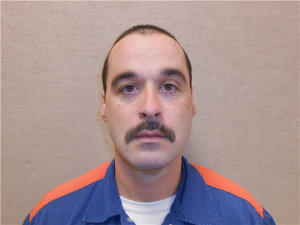
This Feb. 11, 2013 photo provided by the Michigan Department of Corrections shows Michael David Elli …
Elliot was discovered missing from the prison about 9:30 p.m. Sunday, probably 2 ½ hours after he escaped by using his hands to create a hole in two fences, Marlan said.
"There was a perimeter vehicle with an armed officer who was circling the facility during this time period. (Elliot) was able to evade or avoid detection," Marlan said.
He said it wasn't immediately known if electronic security measures at the fence were not working or if Elliot somehow avoided them.
Elliot was serving life in prison without parole for fatally shooting four people and burning down their Gladwin County house in 1993 when he was 20 years old, according to court records. Elliot and his accomplices were trying to steal money from a drug dealer, police said.
He was arrested a few days later and had a gun that tied him to the slayings. One of Elliot's co-defendants testified against him, saying he laughed about shooting the victims in the head.
Elliot was convicted of first-degree murder in 1994.
Nelson Mandela leaves $4 million estate to family, staff, ANC

JOHANNESBURG - Former South African president and anti-apartheid hero Nelson Mandela left his $4.1 million estate to family members, the ruling African National Congress, former staff and several local schools, according to a reading of his will on Monday.
The will was expected to set off another round of squabbling among members of his large and factious family over the Nobel Peace Prize laureate's financial legacy.
Deputy Chief Justice Dikgang Moseneke said he was not aware of any possible wrangle over the provisional 46-million-rand estate, although when the will was read to family earlier on Monday the mood was "charged with emotion."
"I am not aware of any contest of any type and the will has been duly lodged and accepted," Moseneke said.
Mandela's third wife, Graca Machel, is entitled to half the estate under South African marital law but could waive her claims and opt for specified assets that include properties in her native Mozambique. Machel has not made a decision on whether to weave her rights, Moseneke said.
View gallery
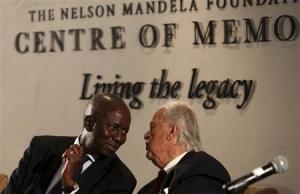
Deputy Chief Justice Dikgang Moseneke (L) chats to Advocate George Bizos, Nelson Mandela's lawye …
Some of the estate would be split between three trusts set up by Mandela, including a family trust designed to provide for his more than 30 children, grandchildren and great grandchildren.
Each of the Mandela children and some of his grand-children received $300,000. His upscale Johannesburg house, where he spent most of his life after being freed from apartheid jails, would be home to his deceased son Makgatho's children.
The ANC, which was Mandela's political home, could receive a portion of his royalties from books and other commercial outlets using his name and image. Mandela staff, including his long-time personal assistant Zelda Le Grange, also shared in the fortune with 50,000 rand each.
"It really makes me happy. I didn't think Tata was thinking of leaving something for me," said Mandela's personal chef Xoliswa Ndoyiya, referring to Mandela using the Xhosa word for father.
Mandela, who died in December at the age of 95, left an estate that also included a modest dwelling in his rural Eastern Cape home province and royalties from book sales, including his autobiography, "Long Walk to Freedom".
More visibly, his legacy includes a potent political and moral brand that some of his grandchildren and great-grandchildren have already used to market everything from clothing to reality TV.
Some of his grandchildren have started a line of caps and sweatshirts that feature his image under the brand "Long Walk to Freedom". Two of his U.S.-based granddaughters starred in a reality television show called "Being Mandela".
Such aggressive marketing - as well as reports of fighting among family members over Mandela's money - have fuelled the impression in South Africa that some of the family members have exploited their world famous relative.
Flight Cancellations Mount as Triple-Threat of Winter Weather Looms

Flight cancellations neared 1,000 early Monday as winter storms brew along the East Coast and in the Rocky Mountains.
Flight-tracking web site FlightAware.com showed the majority of cancellations so far at Philadelphia International, Newark, N.J., and New York's LaGuardia airports.
Delays are at a minimum, with fewer than 200 nationwide.
More than half of the country could receive snow this week starting today, as storm systems pose a triple-threat of winter weather. The East Coast should expect snow from Boston to Washington, D.C., today – with as much as 8 inches of snow falling this morning and into the early afternoon.
A second storm developing in the Rockies should dump 5 to 10 inches of snow from Colorado to Iowa Tuesday, striking the East Coast one day later with another dose of winter weather – this time heaviest snow will be inland in the Northeast with rain, sleet and snow along the coast from Washington, D.C., to Boston.
A third storm is expected to strike across the country near the end of the week, bringing a potential Nor'easter next weekend. It's too early to tell if the third storm will materialize into anything significant.
Several airlines have issued flexible travel policies, waiving change fees for fliers affected by cancellations. Here are links to the major airlines' policies:
Sunday 2 February 2014
Actor Philip Seymour Hoffman died of apparent drug overdose: police source

NEW YORK - Philip Seymour Hoffman, one of the leading actors of his generation, who won an Academy Award for his title role in the film "Capote," was found dead in his Manhattan apartment on Sunday in what a New York police source described as an apparent drug overdose.
Hoffman, 46, was found unresponsive on the bathroom floor of his Greenwich Village apartment by police responding to a 911 call, and Emergency Medical Service workers declared him dead on the scene, New York City police said in a statement. An investigation was ongoing.
A police spokesman said investigators found Hoffman with a syringe in his arm and recovered two small plastic bags in the apartment containing a substance suspected of being heroin. A police department source earlier told Reuters that Hoffman had died of an apparent drug overdose.
Hoffman, who is survived by three children with his partner Mimi O'Donnell, had detailed his struggles with substance abuse in the past.
"We are devastated by the loss of our beloved Phil and appreciate the outpouring of love and support we have received from everyone," Hoffman's family said in a statement issued through his publicist.
"This is a tragic and sudden loss and we ask that you respect our privacy during this time of grieving. Please keep Phil in your thoughts and prayers," it added. A representative said the family would not make any further statements for now.
Onlookers gathered on Sunday afternoon near Hoffman's apartment in a four-story red brick building in a fashionable neighborhood of the West Village, where many other actors keep homes. The entire block was cordoned off by police.
Rachel Melman, a neighbor who described herself as a fan, said she frequently saw him around the neighborhood.
"I never spoke to him, but I always wanted to," she said, adding that she would see him sitting on the scaffolding of the building, often dressed in socks and no shoes, "just reading and hanging out out there.
"Of course I'm sad. It was such a shocker," she said.
CNN, citing a law enforcement official, reported that Hoffman was last seen alive at 8 p.m. Saturday. He had been expected to pick up his children on Sunday but failed to show up, prompting playwright David Katz and another person to go to his apartment, where they found him dead, CNN said.
Hoffman spoke in the past of struggling with drugs, including a 2006 interview in which he told CBS he had abused "anything I could get my hands on. I liked it all."
His death, if confirmed from an overdose, would recall the 2008 death of actor Heath Ledger, who was found dead in his Manhattan apartment from a lethal combination of drugs.
Born in upstate New York near Rochester, Hoffman won the Best Actor Oscar for the 2005 biographical film "Capote," in which he played writer Truman Capote. He also received three Academy Award nominations as best supporting actor, for "The Master" in 2013, "Doubt" in 2009 and "Charlie Wilson's War" in 2008.
After more than a dozen earlier roles, Hoffman burst onto the film scene in 1997's "Boogie Nights," in which he played a lovelorn gay man in a movie about the porn industry that helped make Mark Wahlberg a star.
PORTRAYED DISTURBING CHARACTERS
Hoffman appeared in blockbusters such as "Twister" and "The Hunger Games" series. But he was more often associated with the independent film world for his intense portrayals of often disturbing and complex characters in such films as "Happiness," in which he played an obscene phone caller, and "Before the Devil Knows You're Dead."
In the latter, he played a son who schemes to rob his parents' jewelry store, resulting in their deaths. Hoffman could also play nice, as in his portrayal of an angelic nurse in "Magnolia."
Other noteworthy films included "Moneyball," "The Savages," "Cold Mountain" and "Scent of a Woman," one of his earliest films, which garnered its star, Al Pacino, an Oscar.
Lionsgate, the studio behind "The Hunger Games" called Hoffman "one of the most gifted actors of our generation."
"We're very fortunate that he graced our Hunger Games family. Losing him in his prime is a tragedy, and we send our deepest condolences to Philip's family," the studio said in a statement.
Hoffman also frequently appeared on Broadway, earning Tony award nominations for "Death of a Salesman," "Long Day's Journey Into Night" and "True West."
Showtime, the cable television network which had just ordered a 10-episode comedy, "Happyish," starring Hoffman and produced by his company, Cooper's Town Productions, mourned the loss of the talented actor.
"Philip Seymour Hoffman was one of our generation's finest and most brilliant actors. He was also a gifted comedic talent. It was a great privilege and pleasure to work with him and we are all absolutely devastated by this sudden loss," it said.
Hoffman appeared last month at the Sundance Film Festival in Utah for the premiere of "A Most Wanted Man," an espionage thriller based on the John le Carre novel in which he played German spy Gunther Bachmann.
At the premiere, Hoffman told that he connected to Gunther's personality, a man driven by the shame of previous failure into an obsessive pursuit of capturing terrorists by any means necessary.
"I think it'd be hard for anyone not to connect with the loneliness. He's pretty lonely, driven, obsessive guy, unforgiving of himself in a lot of ways. A lot of traits that a lot of people carry in one grade or another," Hoffman said.
New York Mayor Bill de Blasio said via Twitter: "Saddened by Philip Seymour Hoffman's tragic and untimely passing. Today New York mourns the loss of one of stage and screen's greats."
Saturday 1 February 2014
Trial of Egypt's ousted leader resumes
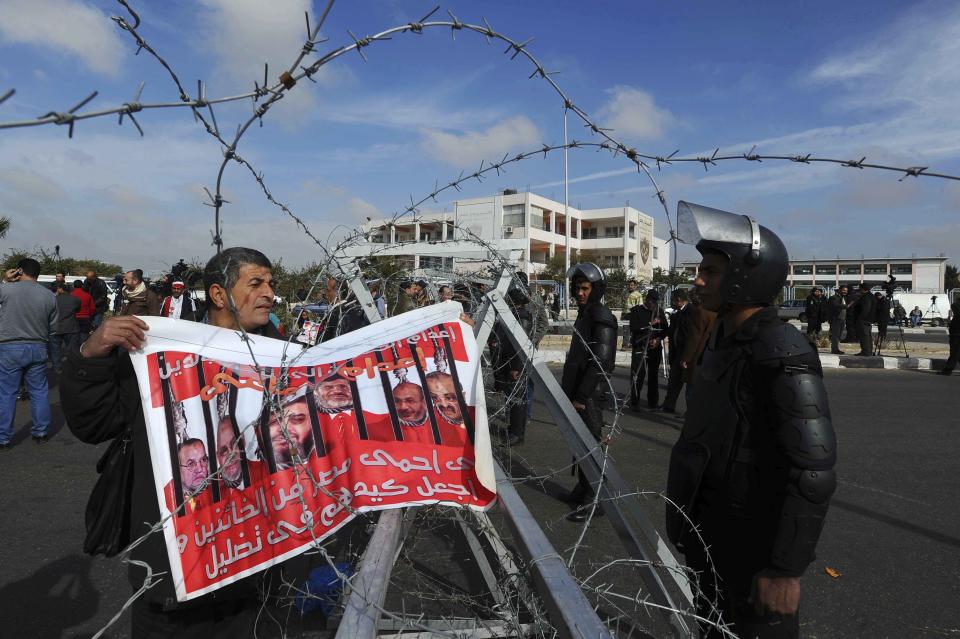
Morsi has consistently insisted that he remains president, part of his Muslim Brotherhood's broader strategy of defying the authority of Egypt's new military-backed government at every turn. He was held in a soundproof glass cage in Saturday's hearing and could only address the court directly if the judge allowed it.
The trial is one of four that Morsi and top leaders of his Muslim Brotherhood face. The charges levelled against them mostly carry the death penalty. Saturday's hearing was adjourned until Tuesday to allow time for the creation of a panel of experts to examine video footage presented by the prosecution as evidence.
Morsi was ousted by a military coup on July 3 that followed millions-strong demonstrations calling on him to leave office. He is now held at a high security prison near the Mediterranean city of Alexandria.
The case stems from violence outside the presidential palace in December 2012. Morsi's supporters attacked opposition protesters, sparking clashes that killed at least 10 people. The defendants are charged with inciting the killing of three of those protesters.
Morsi's three other trials are on charges of escaping from prison during the 2011 uprising against Hosni Mubarak's rule; conspiracy with foreign militant groups to harm Egypt's national security; and insulting the judiciary.
El-Awah contended that if Morsi was not formally dismissed, then he remains the legitimate president to this day and thus the law governing the trial of serving presidents must be observed, according to an account of the proceedings issued by the Egyptian Middle East News Agency.
Morsi and most of the defendants turned their backs to the court when Judge Ahmed Sabry Youssef played several video recordings of the clashes outside the palace in 2012. Morsi, however, remained mostly calm as he stood in his glass cage in contrast to his outbursts during two previous court appearances In November and last week.
Anti-Morsi protesters outside the police academy briefly surrounded el-Awah's car as it approached the police academy's gate. Some pounded on the car while others yelled insults.
El-Awah, a former presidential candidate, was unhurt and later stepped out of the car to complain to a senior police officer.
Egypt has been rocked by a wave of deadly violence since Morsi's ouster, with the army and security forces facing a full-blown insurgency in the Sinai peninsula. The violence has spread to mainland Egypt, with attacks on high profile targets in Cairo growing more frequent.
There also have been near-daily protests by Morsi's supporters. Marchers sometimes carry firearms and use them against security forces, with witness reports suggesting that this is becoming more frequent.
The military-backed government has meanwhile been cracking down on the Brotherhood and its allies, killing hundreds and jailing thousands since July.
In the latest violence, the Health Ministry on Saturday said one person was killed in Cairo and 35 were wounded in clashes on the previous day between police and Morsi's supporters in Cairo and several other cities.
Also Saturday, a new Egyptian militant jihadi group issued its first statement, claiming responsibility for planting explosives and attacking security men and police stations.
In a statement posted on a militant website late Friday, Ajnad Misr, or Egypt's Soldiers, said it will fight the "regime's criminal organs," which it said were being used to humiliate the people and prevent them from performing religious duties.
It said it planted and detonated two explosive devices on a main highway on Cairo's outskirts Friday. Interior Ministry spokesman Hani Abdel-Latif said the explosion hit a vehicle carrying riot police and wounded an officer.
Earlier this week, the major Sinai-based militant group, Ansar Beit al-Maqdis or Champions of Jerusalem, said that that Ajnad Misr was responsible for one of four bomb attacks targeting police in Cairo on Jan. 24. Police said the blast at Talbiya police station caused no casualties.
Monday 20 January 2014
Christie speaks, and looks for lessons

“I will learn things from this,” Chris Christie told me last Friday, a little more than a week after he gave the News Conference to End All News Conferences, and a few days after the cable channels covered his annual address to the legislature in Trenton as if it were Nixon waving from the helicopter. “I know I will. I don’t know exactly what it is yet that I’ll learn from it. But when I get the whole story and really try to understand what’s going on here, I know I’m going to learn things.”
We were sitting in a conference room at a training center for high-tech jobs in Camden, down the street from where Christie had just sworn in a Supreme Court justice. This was his first interview since he had publicly declared himself “embarrassed and humiliated” by the disclosure that his aides had conspired to snarl traffic on the George Washington Bridge, and Christie, who fiddled with a half-eaten pack of vending-machine muffins, seemed more subdued than usual. He described his state of mind, after hearing about the incriminating e-mails from one of his closest aides, as “completely disorienting, like I got hit across the forehead with a 2x4.”
He said he hadn’t watched the song parody that his hero Bruce Springsteen and Jimmy Fallon threw together (singing “Governor Chris Christie Fort Lee, New Jersey traffic jam” in the place of “tramps like us, baby we were born to run”). But he’d gotten a direct message on Twitter from Fallon assuring him it was all in good fun, and his oldest son told him, “It’s actually kind of cool to have Bruce saying your name.” Christie said he wasn’t angry about it.
In fact, Christie went out of his way several times to assure me he was not angry and was not an angry person, even though I hadn’t suggested he was. “It doesn’t mean I don’t get angry – everybody gets angry,” he said. “But they confuse sometimes, if you’re blunt and you’re direct and you just say things the way you see them, that that’s anger. More times than not it’s not anger with me. It’s just my personality.
“So I’m going to learn from this,” he went on. “I can’t tell you yet what it is I’m going to learn. But I am intent on learning from this.”
Christie’s gleeful critics – they are legion, and they are fierce – would suggest that the only lesson in all of this for Christie is that he is a bad governor (and probably a bad person, too), and that that the full truth of his involvement is yet to be known. His backers would tell you (as they told The New York Times Sunday) that Christie just has to be less loyal to longtime aides who do shady business in his name.
But if we’re going to be more thoughtful about it, this question of what exactly Christie should take away from this scandal – assuming, for the moment, that he’s being truthful when he says he knew nothing about it – is a little more complex.
The revelations about traffic inconveniences came at a particularly inconvenient time for Christie. This month, he took over as chairman of the Republican Governors Association, making him the face of what has traditionally been an influential leadership bloc in the party. Christie had planned to use his State of the State address last week, and the inaugural speech he will give Tuesday, to preview the message that he thinks could make him a top-tier contender for the Republican nomination in 2016.
That message is all about finding bipartisan solutions, in contrast to the intransigence in Washington. “We cannot fall victim to the attitude of Washington, D.C, the attitude that says I am always right and you are always wrong,” Christie plans to tell his inaugural audience. “The attitude that puts everyone into a box they are not permitted to leave. The attitude that puts political wins ahead of policy agreements. The belief that compromise is a dirty word.”
Christie, who talked about fostering an “attitude of choice” in his State of the State Address last week, told me he had the same message for his fellow Republicans nationally. “You can make a choice to be just rhetorical, to say this is my position and this is my line in the sand and all the rest of that stuff, and be damned to whether that gets governance done or not,” he said. “Or you can say all that stuff, but also say in the back of my mind there’s going to be a place where I can reach accommodation. I’m asking them to choose to govern.”
Christie’s detractors see this version of bipartisanship as a sham, perpetrated by a handful of Democrats who have allowed themselves to be intimidated. But the record in New Jersey, which has long been one of the most recklessly governed states in the country, would indicate there’s more to it than that. During Christie’s first term, he and New Jersey’s mostly Democratic legislature managed to reform the system for financing public pensions, cap growth in property taxes and extend in-state college tuition to the children of undocumented immigrants, even as they worked together – mostly, anyway – to blunt the effects of a killer hurricane. There aren’t many governors in America who wouldn’t trade for those talking points.
Christie’s strategy has been remarkably consistent, and more sophisticated than it might seem to the casual observer. He is a public bully and a private dealmaker, a guy who bludgeons his opponents into as weak a bargaining position as he can before staking out his own compromise behind closed doors. It’s good theater, followed often, though not always, by good policy.
Someone should probably write a book about Christie’s tumultuous, almost sibling-like relationship with the powerful president of the New Jersey Senate, Stephen Sweeney, a labor Democrat who has called the governor a “punk” and threatened to hit him – and that was just in one week. In the end, the two men, similar in temperament, have repeatedly returned to Christie’s conference table and forged one of the more functional political partnerships anywhere.
“Part of politics is trying to have sharp elbows publicly in order to make a deal privately,” Christie told me. “And if you don’t have the willingness and ability to do that, then the opportunity to make deals privately that benefit the public become much more difficult in my view, and in my experience.”
Here’s the problem, though: even if Christie is as shocked by the revelations as he says, what Fort Lee made clear is that, after four years of this, all those public “sharp elbows” have begun to overtake the private pragmatism. After the viral videos of Christie dressing down constituents and the insults casually tossed around like Frisbees on the shore, it’s apparently gotten hard for Christie’s own aides and allies (some of whom, it seems, aren’t quite as bright as the governor to begin with) to discern where the theatrics leave off and the governance begins.
The bridge fiasco, featuring that horrendous e-mail in which a Christie ally mocked the bus-riding children of Democratic voters, is an extreme case. But now you have the Democratic mayor of Hoboken saying Christie’s lieutenant governor threatened to pull back hurricane relief to force her hand on a real estate development. And you can bet there will be more stories like this in the weeks ahead, stories of aides who thought they were channeling the boss, because their concept of the boss, more and more, resembles Tony Soprano.
In politics, as in life, your greatest strengths almost always become, eventually, your most glaring weaknesses. Think of Christie’s pal Rudy Giuliani, who managed to clean up the streets of New York by leaning on his cops, and then leaned so hard and so long that eventually a lot of non-white New Yorkers were afraid of their own police force. Or Barack Obama, who’s cool, “no-drama” demeanor was considered a major asset until congressmen started complaining he wasn’t passionate or needy enough.
“I think I’m a fairly good politician,” Christie told me, in defense of his rhetorical style. But the best at his craft learn, sooner or later, to rein in and recalibrate the things that work for them, especially if they entertain thoughts of the White House. “I think it is most likely that the next Republican nominee for president will be a governor,” Christie told me. I reminded him that in 2011 he had told me he didn’t feel ready to be president, and asked about now. “Yeah. I’m readier, if that’s a word,” Christie said.
It is. And the experience of the past few weeks may help to make him readier still, but only if the worst revelations are now behind him, and only if he takes the deeper lesson from them. Only if he figures out some way to preserve the blunt persona that got him here, without letting that persona overwhelm the political philosophy that underlies his accomplishments.
On Friday, Christie didn’t sound like a guy who intended to revisit his style. “I’m not growing a new personality at 51,” he said. I reminded him that politicians do it all the time. “Not me, man,” he laughed. “This is it. I like who I am.”
But Christie admitted the public pummeling had seared him. “I don’t think anybody knows what it feels like to have the kind of attention that I’ve had in the last nine days until you go through it,” he said near the end of our interview, sounding spent. “It’s awful. Listen, it’s awful. I can explain to you as vividly as you like, but you won’t get it.
“I’m trying to get my arms around an awful situation,” he sighed, “and understand it, and then address it, and then resolve it.”
Chris Christie vows he’ll learn something. And then the rest of us will learn something about whether he’s a great politician, or just a fairly good one.
Subscribe to:
Posts (Atom)
Popular Posts
-
CAIRO — Three bombs exploded Wednesday outside Cairo University's main campus, hitting riot police deployed against near daily prot...
-
Pernah anda melihat pokok yang hanya berdaun pada bahagian atas? Walaupun rupanya agak pelik, tetapi tumbuhan ini yang dikenali sebagai Baob...
-
Gambar Lana Nordin yang dikutuk peminat di Instagram - Tindakan seorang peminat dikenali Ainiazmi yang menegur secara langsung gambar sek...
-
Misteri Payudara Menjadi Sarang Larva Ulat Akhirnya Terungkai | Ketika itu Susan McKinley baru saja pulang dari ekspedisi di Amerika...
-
WASHINGTON - The District of Columbia's city council will vote on Tuesday on whether to decriminalize marijuana in a move that could...
-
Itu yang hot sekarang, MP Kepala Batas kahwin lagi satu, dengan bekas artis Mas Anizan yang popular awal tahun 90an. Tapi katanya anak ...
-
Skandal memalukan keluarga diraja Arab Saudi yang melibatkan putera raja yang belot khianat keluar daripada keluarga diraja Saud, malah put...
-
KOTA BAHARU: Wan Nurdiyana Mohd Kamarul Zaman atau nama komersialnya, Dayana Kamal, salah seorang daripada tiga yang rentung dalam kemala...
-
PETALING JAYA: Pelakon popular tahun 1980-an, iaitu Rosnah Mohd Noor, 54, meninggal dunia pada pukul 2.55 petang Ahad di Hospital Kuala Lum...

















